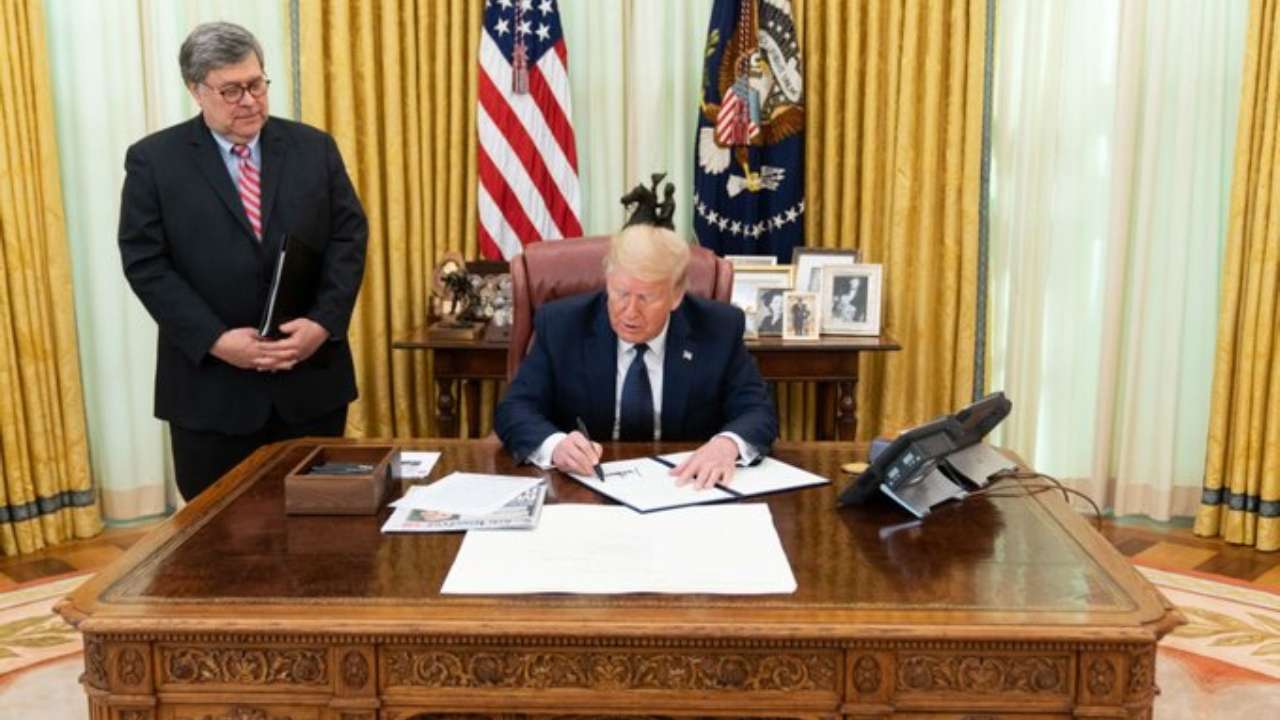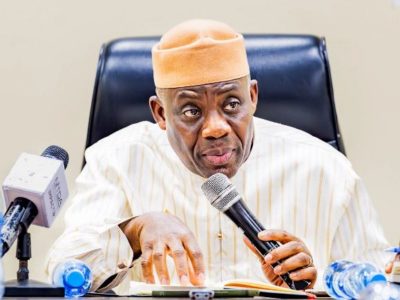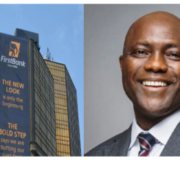Days after Twitter, for the first time, tagged United States President Donald Trump’s tweet as “potentially misleading” United States President Donald Trump on Friday signed an executive order to prevent online censorship by tech corporations, including social media platforms.
“In a country that has long cherished the freedom of expression, we cannot allow a limited number of online platforms to hand pick the speech that Americans may access and convey on the internet. This practice is fundamentally un-American and anti-democratic,” the executive order stated.
“Online platforms are engaging in selective censorship that is harming our national discourse. Tens of thousands of Americans have reported, among other troubling behaviors, online platforms “flagging” content as inappropriate, even though it does not violate any stated terms of service; making unannounced and unexplained changes to company policies that have the effect of disfavoring certain viewpoints; and deleting content and entire accounts with no warning, no rationale, and no recourse,” it added.
Reaction: Breaking Down Trump’s Executive Order Targeting Social Media Companies
President Trump has signed an executive order targeting social media and tech companies and the internet law that provides them broad legal immunity over content posted by users.
Jon Epstein is a partner/shareholder at the national law firm Hall Estill who has worked in media law for almost three decades representing national, regional, and local media entities (including network television stations and national newspapers). He also regularly advises clients on protections and risks related to social media.
He has had a chance to read the official order and of it says: “During his campaign and since he was elected, President Trump has engaged in a heated conflict with reporters and media platforms who have criticized or questioned him. This is not the first time that this President has considered issuing an executive order designed to remove the protections that were given to social media platforms by Congress in section 230. Until today, he had refrained from doing so.
“The issue returned after Twitter fact checked the President’s recent tweets. This angered him and his supporters because they view certain platforms as adversaries that promote criticisms of the President and his agenda. Others view those same platforms as tools that allow the exchanges of information that serve as a watchdog on the government and elected officials. The current dispute appears to be based on whether the actions of these platforms in addressing posts by the President or others is done in good faith,” adds Epstein.
Preventing Online Censorship
“Well, today he did it. President Trump issued an Executive Order (“EO”) he entitled “Preventing Online Censorship.” While he expressed his opinion that online platforms are engaging in “selective censorship” that is “harming national discourse,” he did not attempt (in the EO) to erase the protections created by Congress in 1996.
“Instead, rather than attempt to use his office to unilaterally erase those protections for those he perceives to be his political opponents, he took a procedurally more tempered approach and ordered the Attorney General, all executive departments and agencies, the Secretary of Commerce, the National Telecommunications and Information Administration, the Federal Communication Commission, the Department of Justice and a “working group” established by the Attorney General to take certain actions to review the protections and any complaints by the administration and the public about the platforms. It is those actions (and not the EO) that may lead to repeal or modification of section 230,” Epstein further adds.
“The President ordered various government officials and agencies to do the following:
1. “All executive departments and agencies should ensure that their application of section 230(c) properly reflects the narrow purpose of the section and take all appropriate actions in this regard;
2. “The Secretary of Commerce, in consultation with the Attorney General, and acting through the National Telecommunications and Information Administration (NTIA), shall file a petition for rulemaking with the Federal Communications Commission (FCC) requesting that the FCC expeditiously propose regulations to clarify certain aspects and interpretations of section 230;
3. “The head of each executive department and agency (agency) shall review its agency’s Federal spending on advertising and marketing paid to online platforms. Such review shall include the amount of money spent, the online platforms that receive Federal dollars, and the statutory authorities available to restrict their receipt of advertising dollars;
4. “The Department of Justice shall review the viewpoint-based speech restrictions imposed by each online platform and assess whether any online platforms are problematic vehicles for government speech due to viewpoint discrimination, deception to consumers, or other bad practices;
5. “The FTC shall consider taking action, as appropriate and consistent with applicable law, to prohibit unfair or deceptive acts or practices in or affecting commerce. Such unfair or deceptive acts or practice may include practices by entities covered by section 230 that restrict speech in ways that do not align with those entities’ public representations about those practices;
6. “The Attorney General shall establish a working group regarding the potential enforcement of State statutes that prohibit online platforms from engaging in unfair or deceptive acts or practices. The working group shall also develop model legislation for consideration by legislatures in States where existing statutes do not protect Americans from such unfair and deceptive acts and practices. The working group shall invite State Attorneys General for discussion and consultation, as appropriate and consistent with applicable law;
7. The Attorney General shall develop a proposal for Federal legislation that would be useful to promote the policy objectives of this order;
“There is nothing wrong with a President suggesting legislation for Congress for it to debate and address. If Congress then enacts legislation that modifies section 230, that legislation may be the subject of litigation. There is also nothing improper with an executive asking various agencies to consider and review certain things that he finds troubling as long as that review is done properly. If any agency action is challenged, such action would also be litigated,” Epstein says.
“While the President stopped short of erasing the section 230 protections with his EO, it is clear that he is encouraging the agencies to determine that the platforms are “problematic vehicles for government speech due to viewpoint discrimination, deception to consumers, or other bad practices.”
It is concerning that much of the work will be done by a “working group” established by the Attorney General because that “working group” will likely be limited to members who share the President’s views. While it would be fairer and more effective if the membership included individuals, who had knowledge and experience in the industry and had diverse opinions on the subject, the President and the Attorney General are entitled to choose the members. Elections have consequences. While the selection of the group members may not be litigated, any action by that group could be challenged and any proposed legislation would have to be debated and voted upon by Congress,” Epstein says.
“The EO is troubling to those who believe that the section 230 protections are necessary and that the use of the platforms should not be censored based on political viewpoints by government officials. We may have to await further action before the bulk of these issues reach the courts. However, we are on the verge of the battle that the President appears to have sought since his campaign,” says Epstein.





























